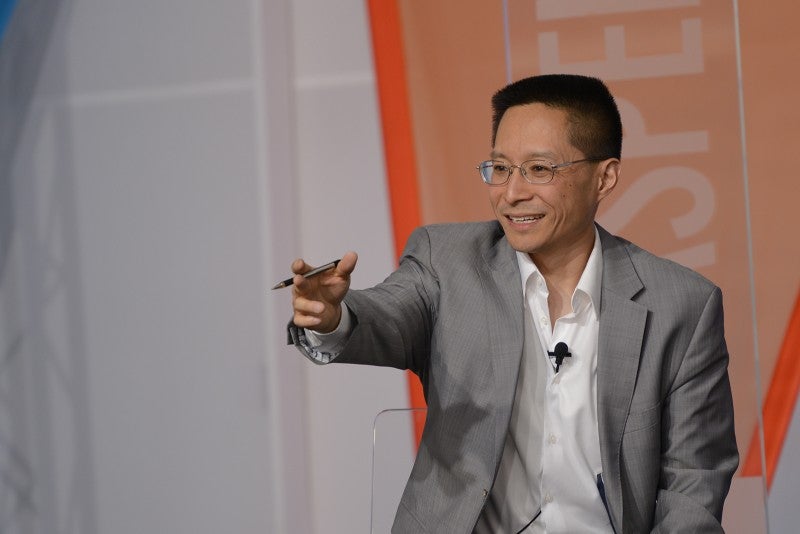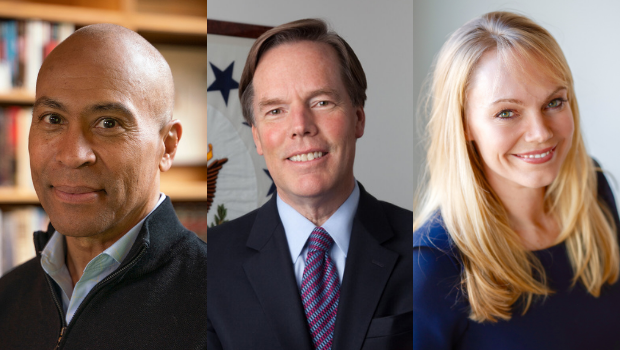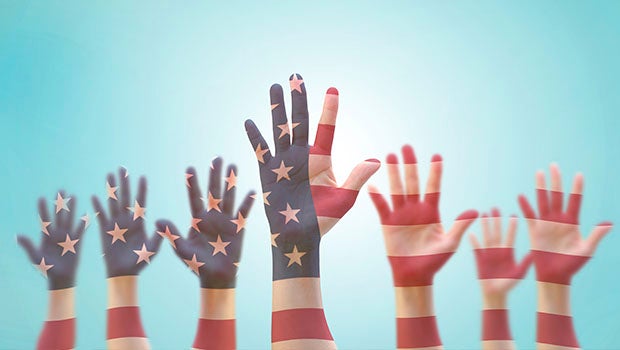Aspen Journal of Ideas: You say we need to “redefine Americanization.” Why?
Eric Liu: We’re at a moment in American life where because of severe and widening inequality on the one hand, and rapid demographic flux and change on the other, the basic underlying question of “who is us” is incredibly urgent right now.
It’s getting harder to sustain a coherent sense of shared stories, shared national identity, and common citizenship.
We need a 21st century form of Americanization that retains the confidence and the belief that we do have something distinctive and unique as a national culture that’s worth preserving, a creed, an ethic of heterogeneity and hybridity, that is worth sustaining.
AJI: News stories like the fatal police shooting of a black man in Ferguson, MO, and several Americans leaving the country to join terrorist groups such as ISIS show the heightened tension we face in this country. How do we break down the barriers to bring a sense of oneness in the US?
EL: Whether it is our Declaration [of Independence], or the Preamble to the Constitution, or [Abraham Lincoln’s] Gettysburg [speech], or [Martin Luther King Jr.’s] ‘I Have a Dream,’ these seminal texts hold us to a different standard. And they hold us to a standard that we as a country have yet to actually live up to fully. And when we fail to live up to that standard, you have situations like what has unfolded in Ferguson.
When we fail to live up to that standard you have alienation and a sense of disconnection to the center of American life that will lead citizens of this country not only to leave this country, but to take up arms against it.
Whether we deliver upon [it] is measured upon how well we integrate immigrants and new Americans and give them a sense of voice, stake, and ownership in civic life and economic life. And whether we’re fully delivering upon the promise of American life [depends on] whether we indeed make this a country again of high social mobility and dispersed opportunity. Until and unless we do that we haven’t earned a thing. We haven’t earned the right to pat ourselves on the back. And it’s that exceptional burden, of trying always to live up to our creed and our potential, that animates this project, […] but [is] also so consequential in our times because of all of the change and upheaval that’s going on both here and around the world.
AJI: What role does inequality play in the idea of citizenship?
EL: Inequality is not just an economic phenomenon. Economic inequality begets political inequality. And political and civic inequality in turn deepens economic inequality, and you get a vicious circle set in motion.
I think the time that we’re in right now — [one] where everybody recognizes that the United States is being pulled apart by a crisis of widening inequality, — we have to take pains to figure out how we build bridges and how we build this sustainable, coherent, compelling, magnetic idea of the unum that adds up to something greater than the sum of our pluribus. And I think that is always the American challenge, but it’s especially heightened in a time of inequality.
We have got to make sure that the promise of equal citizenship is not a casualty of the crisis of economic inequality.
AJI: Some would say Congress is part of the problem when it comes to a divided America? Is it?
EL: Congress is stuck and polarized right now in ways that are both a symptom and a cause of the larger breakdown of civic culture in the United States. On one level you can say, ‘Gosh, if we could just get rid of this Congress things would be better;’ perhaps that would be true. At the same time, we are getting precisely the Congress we deserve right now, as a country. And by that I mean, when essentially half the electorate does not vote, we haven’t quite earned the right to just say the system is broken. We haven’t put the proposition fully to a test.
If everybody in this country who was in fact eligible to vote cast a ballot, we would have overnight a peaceful, bloodless revolution. We would have a government far more responsive to [the] wants and needs of a great majority of Americans rather than what we have today, which is either a policy that is bent and distorted to meet the needs of the very few, or total gridlock.
As dysfunctional as Congress is today, at the end of the day it still comes back to whether citizens show up. And citizens have to show up in ways that begin with the franchise, but don’t end there. We’ve got to be able to start, as citizens, reclaiming voice and power from the bottom up: the neighborhood level, community level, re-exercising muscles of civic power so that Congress, which by design is meant to be a group of civic followers rather than leaders, follows the will of the people.
The problems of polarization right now are mainly problems of a great silent majority of Americans walking away from the field of play, and that’s dangerous. I think we all have to get back out there, start claiming the field, start voting, start speaking up, and make this country’s politics more reflective of what I think the actual spirit of the great majority of Americans is.



